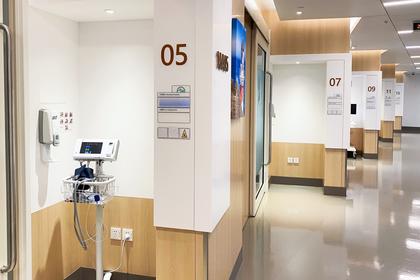Search
What is immuno-oncology (IO) treatment?
Under normal circumstances, the human immune system can identify and remove tumor cells in tumor microenvironment, but tumor cells can adopt different strategies to inhibit the immune system, thus survive and even continue to develop at various stages of the anti-tumor immune response.
Immuno-oncology (IO) treatment or immunotherapy is a treatment that controls and clears tumors by restarting and maintaining the tumor-immune cycle and restoring the body's normal anti-tumor immune response.
Because of its excellent efficacy and innovation, immunotherapy was named the most important scientific breakthrough of the year by Science magazine in 2013. In recent years, good news about immunotherapy has been continuously reported, and it has shown strong anti-tumor activity in the treatment of various tumors. Multiple tumor immunotherapy drugs have been approved for clinical application in dozens of countries around the world, which brings new hopes for cancer patients.
What is the principle of I-O?
Cytotoxic T cells in human lymph nodes are the powerful source in immune system to kill tumor cells. However, in order to prevent "injury" of healthy cells, T cells are also subject to the restriction of "immunization checkpoints", which in turn gives the tumor a chance to grow. Some tumor cells begin to induce "checkpoints" to escape the immune response after being attacked by T cells. PD-1 (Programmed Death 1, Programmed Death Receptor 1) / PD-L1 (Programmed Cell Death 1 Ligand 1, programmed death ligand) signaling pathway is one of the mechanisms. By secreting PD-L1, tumor cells bind to PD-1, initiate programmed cell death of T cells, and allow tumor cells to obtain immune evasion.
The working principle of PD-1 inhibitors is to break the binding of PD-1 and PD-L1 and restart the attack and killing function of T cells on tumor cells.
What disease type could benefit from PD-1?
Currently, PD-1 inhibitors that have been marketed include Pablolizumab (Keytruda) and Nivolumab (Opdivo). US FDA has approved Opdivo for cancer indications of small cell and non-small cell lung cancer, head and neck squamous cell carcinoma, colorectal cancer (MSI-H/dMMR), melanoma, liver cancer, classic Hodgkin's lymphoma, kidney cancer, bladder cancer, etc. Our domestic CFDA approved Opdivo for second-line treatment of non-small cell lung cancer.
Data from PD-1 manufacturer BMS showed that the five-year survival rate of cancer patients who took PD-1 inhibitors increased several times compared with traditional treatments. For patients with non-small cell lung cancer, the survival rate of lung cancer patients receiving traditional treatment is usually less than one year. The three-year survival rate of immunotherapy in lung cancer has reached 30%, and the five-year survival rate can reach 15.6%.
What are the side effects of Opdivo?
Opdivo (nivolumab) is different in mechanism from traditional chemotherapeutic drugs. Most of the adverse reactions during the treatment are mild or moderate. Serious adverse reactions are extremely rare, but the consequences may be very serious. Therefore, it is necessary to monitor the side effects of Opdivo medication. Please read the following information carefully with your family:
(1)Adverse reactions may occur at any stage of the treatment, and it is more likely to occur after the treatment has been started for a period of time because your immune system has been activated and is more likely to have an adverse reaction due to immune hyperfunction.
(2) If you feel chest tightness, wheezing, swollen facial lips or even swollen tongue, it means that you may have a severe allergic reaction. If the situation is urgent, please call 120 for help.
(3) If you have the following discomfort, don't panic and please contact your health care team immediately:
• Pulmonary symptoms: cough, chest tightness and pain, shortness of breath, etc.
• Intestinal symptoms: diarrhea, especially bloody, dark or tarry stools
• Severe stomach pain or tenderness
• Liver and kidney function damage: symptoms as nausea and vomiting, pain in the right side of the abdomen, dark urine, decreased urine output, light colored stool, yellowing of the skin or eyes
• Discomfort caused by hormonal changes: rapid heartbeat, significant weight gain or loss, dizziness, chills and even syncope; thirst and polydipsia, increased urine volume
• Other symptoms include: skin and mucous membrane ulcers, fever, fatigue, lethargy, memory disorders
(4)In addition, the following adverse reactions may occur during treatment, which usually does not affect your normal life. Of course, you can also contact us for further help:
• Fatigue
• Loss of appetite sometimes accompanied by nausea
• Mild cough and shortness of breath, sometimes upper respiratory tract infections may occur which can usually disappear spontaneously
• Rash and itching, it is important to note that if you have a large number of rashes, please seek medical advice promptly.
• Constipation or diarrhea
• Muscle and joint pain
(5)Other precautions during treatment
In addition to the above-mentioned adverse reaction, Nivolumab may affect your body's functions by activating your immune system. You need to follow your doctor's regular follow-up. Some related tests are essential for us to assess your physical condition. Blood routine, liver function, and thyroid function are usually checked regularly.
Nivolumab may have little interaction with other drugs, but to ensure medication safety, we will ask you about your medication history in details before each treatment. If you need other medications during the treatment, be sure to let your doctor know that you are using Nivolumab.
Preparations before medication
Please assist your medical team to know your history of allergies and medication before using the medicine to ensure medication safety;
If you have had an autoimmune disease (such as colitis, Crohn's disease, lupus), organ transplant, lungs or breathing problems, please let us know.
Please relax during the medication, keep normal diet, and have proper rest.
At the end of each treatment, we will remind you of the time of next medication. If you missed the appointment, please contact the medical team timely.
What services can Jiahui International Cancer Center provide for patients under I-O?
As the first demonstration center for immuno-oncology (IO) treatment in China, the Immune-oncology Center of Excellence at Jiahui International Hospital has received the first patient and completed the first infusion of O-medicine. (PD-1 antibody drug Opdivo) on August 29.
In cooperation with the affiliated hospital of Harvard Medical School, Massachusetts General Hospital as a strategic partner, Jiahui is committed to providing patients with Opdivo medication assessment and monitoring services based on international standards.
Massachusetts General Hospital, as the teaching hospital under the Harvard Medical School, has been using PD-1 immunotherapy for over 8 years, treating more than 20,000 cancer patients, and is the world's most experienced hospital for providing immunotherapy to Asian patients. At the Cancer Center of Jiahui International Hospital, patients may make an appointment to receive a diagnosis from one or several oncologists at the Massachusetts General Hospital through video or face to face. Now experts from Massachusetts General Hospital provides clinical services at Jiahui for one week per month on average. They will work with the doctors of Jiahui International Cancer Center to sort out the patient's condition and explore an overall treatment plan through multi-angle considerations such as pathology, genetics, and etc.
Please dial (021) 53393266 during working hours (Monday-Friday, 9:00-18:00) for more information. Or leave a voice message at other times and we will contact you as soon as possible.
Click the link for more information on Jiahui International Cancer Center Clinical Service











